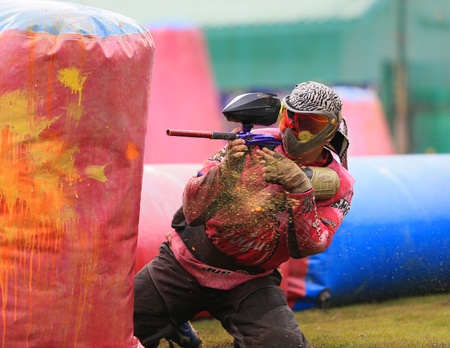Injuries from Non-Powder Guns
June 24, 2015 | Category: Defective Products | ShareA recently-released study (April 2015) from the Stanford University School of Medicine found that injuries from "non-powder" guns surged a 511 percent between 2010 and 2012.
Also in April 2015, Science Daily reported that over 3,000 children were treated in 2012 (latest available statistics) in U.S. emergency departments for eye injuries because of paintball guns, airsoft guns, BB guns and pellet guns, all of which are popular non-powder guns. With an estimated 3.2 million non-powder guns sold in the U.S. each year, over 2.4 million eye injuries occur as a result of trauma. "During the summer, we are getting about one of these a week," said David Rogers, a pediatric ophthalmologist from Columbus, Ohio.
The Stanford study was led by Ophthalmologist Douglas Frederick, M.D. who said, "These results demonstrate that air guns can cause severe, yet preventable, eye injury among the pediatric population. To reduce rates of pediatric eye injury, both practitioners and air gun companies should promote and lobby for eye safety mandates among all air gun users. Furthermore, changes in state policy to regulate possession and usage of air guns among minors may be warranted to reduce rates of accidental injury."
Airsoft guns are increasingly becoming responsible for ocular injuries in children. Most of the airsoft guns sold fire small plastic pellets which can cause serious eye injuries. "When the pellet hits the eye, it can cause lacerations of the eyelid, and it can cause corneal abrasions. But, more significant than that, the blunt trauma to the eye can cause bleeding inside the eye itself," said Dr. Joy Soprano, Primary Children's Medical Center.
According to the Heart of Florida Regional Medical Center, non-powder guns caused more eye injuries than all other causes put together, including fireworks and such sports as baseball, tennis and hockey. Many of these injuries caused permanent damage to children’s eyesight.
What guns are in the category of "non-powder" guns?
Non-powder guns include, BB guns, paintball guns, airsoft guns and pellet guns. They differ in size, shape and color and each shoot a different type of ammunition. (Source: Nationwide Children's Hospital)
- BB guns fire ball bearings (BB’s), which are small, round metal balls.
- Pellet guns fire small pellets, usually made of lead, which vary in shape.
- Paintball guns fire paintballs, which are small gelatin balls filled with paint.
- Airsoft guns fire small, plastic pellets.
What makes these toy guns so dangerous?
In addition to the eye, and other injuries, law enforcement and others have mistaken non-powder guns for real firearms because non-powder guns are commonly designed to appear almost indistinguishable from actual firearms. A New York Times investigation found that, "In recent years, dozens of police officers in Texas, California, Maryland, Florida and elsewhere have shot children and adults armed with what they believed were handguns but that were determined later to be BB guns or other types of air pistols.”
Are there any laws regulating the use of non-powder guns?
The federal government has no laws regulating non-powder guns. Only twenty-two U.S. states regulate the transfer, possession and use of non-powder guns. Only four states define some, or all non-powder guns as firearms, with only three classifying them as dangerous weapons. The Journal of the American Association for Pediatric Ophthalmology and Strabismus (AAPOS), which analyzes the trends in hospital admissions associated with different types of firearms and suggests regulations to help prevent serious injuries, says that the lack of regulations, lack of advertising directed at teens and a failure to wear eye protection all contribute to the increase in non-powder gun injuries.
According to Florida statute 790.22, the use for any purpose whatsoever of BB guns, air or gas-operated guns, or electric weapons or devices, by any minor under the age of 16 years is prohibited unless such use is under the supervision and in the presence of an adult who is acting with the consent of the minor’s parent. Florida gun laws further apply to BB guns and other replica toy guns, meaning a child cannot shoot in public road ways, carry a toy gun concealed, or use the gun in any other illegal manner.
"Non-powder guns such as airsoft, pellet, paintball and BB guns are not toys. As mentioned above, every year there are serious accidents causing serious injuries. If you or a loved one has been injured as the result of the negligence of another using a non-powder, or any, gun, contact Spivey Law Firm, Personal Injury Attorneys, P.A.," said Attorney Randall Spivey.
Fort Myers Personal Injury Attorney, Randall L. Spivey is a Board Certified Trial Attorney – the highest recognition for competence bestowed by the Florida Bar and a distinction earned by just one (1%) percent of Florida attorneys. He has handled over 2,000 personal injury and wrongful death cases throughout Florida. For a free and confidential consultation to discuss your legal rights, contact the Spivey Law Firm, Personal Injury Attorneys, P.A., in Lee County at 239.337.7483 or toll free at 1.888.477.4839,or by email to Randall@SpiveyLaw.com. Visit SpiveyLaw.com for more information. You can contact Spivey Law Firm, Personal Injury Attorneys, P.A.in Charlotte County at 941.764.7748 and in Collier County 239.793.7748.

